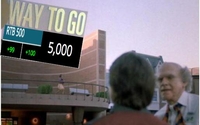
Yeah, I know what you’re thinking -- enough
with the temporal metaphors already. Especially today. But if anyone has a right to exploit it, someone writing for something called "RTBlog" in a publication called Real-Time Daily
should be forgiven. We did it in our past. We’ll do it in our future. Heck, we’re doing it right now.
Speaking of now, I just had a conversation with Collective’s
Joe Apprendi about it, and he reminded me we weren’t born yesterday. This programmatic stuff began some years ago. So long ago, that its founders initially began referring to themselves as the
“Old Timers.” Clearly, they were thinking ahead.
What’s Apprendi thinking about now? Mainly about the ridiculous margins being eaten up by programmatic middlemen,
the lack of transparency -- but perhaps more importantly, the lack of clarity advertisers are getting from the current programmatic marketplace.
advertisement
advertisement
Let’s take them one at a time.
As for eroding margins, Apprendi notes that the ad-tech tax has grown from about 50% of the cost of a programmatic buy when it was the original “ad networks” enabling a brand to aggregate
and buy their audience. That has grown to about 80% of the cost of a programmatic buy, largely because there are so many intermediaries in the process now -- DSPs, DMPs, viewability, non-human
traffic, and of course, attribution firms. In other words, the process has simply become more bloated with more middlemen taking more cuts out of the pie.
Personally, I agree with
Apprendi’s overall observation, but in a way I think it’s inevitable -- because there’s simply more interest, more action, and more accountability associated with programmatic
audience buys. And with bigger budgets and bigger brands, you’ve got to have more accountability.
That said, Apprendi believes much of it is simply bloat and confusion due the
fact that the industry still lacks any “interoperable” standards, which creates inefficiency, confusion, workflow, etc. That in turn has added to the bloat.
Apprendi said
he was moved to weigh in on these issues because of a recent piece written by London columnist Sean Hargrave on the impact of the programmatic tech tax on independent agencies. It can be stifling for
sure. Based on Collective’s internal estimates, managing a current, state-of-the-art programmatic buy could involve as many as two dozen individual single-point solutions from beginning to
end.
On the bright side, he said independent shops have an opportunity to learn from the mistakes of big established agencies that have already sunk costs into the current tech
stacks. They can learn from the current best of breed, pick and choose from among them, and ideally develop new, better processes. Presumably, more streamlined and interoperable ones.
Apprendi isn’t pooh-poohing the need for these solutions and doesn’t diminish the need to be accountable about viewability, fraud, and especially attribution. He’s just
saying it’s overly complex and the real innovation in the programmatic marketplace will come when the stack is less complex, more interoperable, and has greater clarity from end-to-end.
Okay, that’s it for today. Come back tomorrow when we’ll talk more about the future, and probably the past.